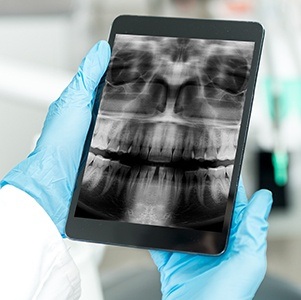Root Canal Therapy Colorado Springs
A Reliable Solution for Damaged Teeth

Most people have heard of root canal therapy, but few know what this procedure is used to treat or exactly how it works. You may be fearful of root canal therapy, but it is actually a relatively simple procedure, and we can make the process more comfortable than you might imagine! Continue reading below to learn more about how root canal therapy in Colorado Springs may be able to preserve your damaged tooth, end your toothache, and support your long-term oral health.
Why Choose Anderson Family Dental by Espire for Root Canal Therapy?
- Able to Quickly Relieve Severe Dental Pain
- Local Anesthetic Promotes a Stress-Free Procedure
- Kind, Compassionate, & Highly Skilled Dental Team
Do I Need Root Canal Therapy?

Teeth have three main layers. The innermost layer, known as the pulp, consists of nerves and soft tissues. When it becomes infected or damaged, you may need root canal therapy.
Here are some common indications that this procedure is necessary:
- You have a throbbing, severe toothache.
- A tooth is visibly darker than the ones around it.
- There is obvious damage to a tooth, such as a deep crack or large cavity.
- There is a pimple-like bump on your gums.
In some cases, root canal therapy is required even when no obvious symptoms are present. If we recommend this treatment, you can be confident that we have your best interests at heart.
The Root Canal Process

To start the process, we administer local anesthesia to numb your tooth and the surrounding area. Thanks to this provision, you should feel very little while we are working. Once that takes effect, we carefully use special tools to access the interior portion of your tooth. Then, we clean out infected tissue and remove the nerve inside the tooth that was sending pain signals to your brain. Next, we fill the tooth with an inert material. We may also place a temporary crown on it. Later, you should get the temporary crown replaced with a permanent restoration to protect your treated tooth.
The Benefits of Getting a Root Canal

Root canal therapy might seem intimidating at first, but it can offer some significant benefits:
- It can prevent an extraction. By preserving your natural tooth, you can avoid the inconvenience and oral health complications of having a gap in your smile. You can also spare yourself from the expense of tooth replacement.
- Root canals have a high success rate. If all goes well, which is likely, you can expect your treated tooth to remain functional and pain-free for many years.
- Maintaining your results is easy. By taking good care of your dental crown through oral hygiene and other practical matters, you can easily reduce the risk of additional harm to your treated tooth.
- Root canal therapy is easy. Many patients remark that it feels similar to having a small filling placed. It is really nothing to be afraid of!
Understanding the Cost of Root Canals

The cost of root canal therapy depends on a few factors. During your consultation, our team will provide a detailed price estimate and answer all your questions about accepted payment methods. We want your treatment to be as low-stress as possible, so you can expect us to be courteous, helpful, and informative regarding the financial aspect of your care.
Factors That Can Affect Root Canal Cost

Some of the main factors that can influence the cost of root canal treatment include:
- The specific tooth that requires treatment. Some teeth have more complex anatomy than others, so they require more time and effort to treat. Because of this, treatment for molars may cost more than it does for front teeth.
- The overall complexity of your case. We can handle many root canal cases right here in our office. If we need to refer you to an outside specialist, you can expect them to have a different pricing structure than our own.
- Additional services. You are likely to need a crown after your root canal. This is an additional cost that you should factor into your budget.
Is It Cheaper to Pull My Tooth?

The initial cost of a tooth extraction is cheaper than that of root canal therapy and a crown. However, it is important to also think about the long-term implications of each choice. A successful root canal can save your tooth and allow it to continue functioning for years — perhaps indefinitely. It is a “one and done” treatment.
In contrast, after a tooth extraction, you should pay for tooth replacement. Otherwise, you may be at risk of additional tooth loss and other oral health problems. A dental implant can cost a few thousand dollars. In the long run, it is often more affordable to get a root canal and keep your natural tooth!
Does Dental Insurance Cover Root Canals?

Some dental insurance plans cover root canal therapy. Usually, this service is classified as a major procedure, so around 50% of its cost might be covered, up to the amount of your plan’s annual maximum. At Anderson Family Dental by Espire, we welcome PPO insurance and are even in-network with several popular plans. We will be happy to help you figure out how your benefits may apply and file timely claims on your behalf.
Other Options for Making Root Canal Therapy Affordable

Beyond insurance, other provisions that might make it easier to afford root canal therapy include:
- Our in-house membership plan. In exchange for a reasonable fee, you can get all necessary preventive care and a discount on other services, including root canal treatment.
- We are happy to accept CareCredit. After a brief application process, you may be approved for a low-interest or no-interest payment plan that fits within your family’s budget.
Root canal treatment is an investment in your smile’s long-term health! To learn more about this service and its cost, contact our friendly front office team today. We look forward to speaking with you!
Root Canal Therapy FAQs
How Long Does It Take to Recover from a Root Canal?
Patients tend to heal at different rates. Generally speaking, most are able to go back to work or school the day after their procedure. However, you might need to take a bit more downtime if your job requires a lot of physical activity.
For the first few days of your recovery, you can expect your mouth to be sore. Over-the-counter pain medications can help with any discomfort. You should also eat soft foods and avoid chewing with the treated tooth.
Most patients are back to feeling normal within a week or so. If you experience lingering pain or any other concerning symptoms, contact our team right away.
How Much Pain Is Normal After a Root Canal?
Our Colorado Springs dental team takes great care to make patients comfortable during root canal treatment, so you should expect the procedure itself to be quite easy. After any local anesthetic wears off, though, your mouth is likely to be sore and sensitive. Usually, over-the-counter pain relievers provide adequate relief. A soft diet can also be helpful.
If the pain does not start to subside within three days or so, give us a call so we can assist you.
How Long Do Root Canals Last?
Root canal therapy is successful in most cases, and it is common for treated teeth to provide many years of reliable function and chewing power. In fact, there is a chance that your procedure will provide lifelong benefits!
Of course, the duration of your results depends on a few factors. For example, new damage to the tooth or a new infection might lead to the need for root canal retreatment. Or, in some cases, an original root canal fails due to lingering bacteria inside a tooth. Damage to the crown on top of a tooth (or a complete lack of a crown) could also contribute to root canal failure.
To help your treated tooth stand the test of time, you should maintain excellent oral hygiene, regularly visit our team for checkups, and adhere to other good oral care habits.
Do I Need Antibiotics Before or After My Root Canal?
Most patients do not need to take antibiotics either before or after undergoing root canal therapy. However, we might prescribe them for you if you have certain health conditions that increase your risk of contracting an infection after a dental procedure.
Be sure to provide honest and up-to-date information about your medical history so we can accurately assess whether antibiotics are necessary in your unique case.
Can Root Canals Be Prevented?
Often, the need for root canal therapy can be prevented if you adhere to good habits that promote oral health. For example, you should regularly brush and floss your teeth. A balanced diet and regular dental visits are also helpful. Additionally, you should wear a mouthguard during sports or to prevent teeth grinding if necessary. These measures can significantly reduce the risk that any of your teeth will develop an infection that requires root canal therapy.
If you would like personal guidance on how you can prevent the need for major dental procedures, talk to our friendly and knowledgeable team.
